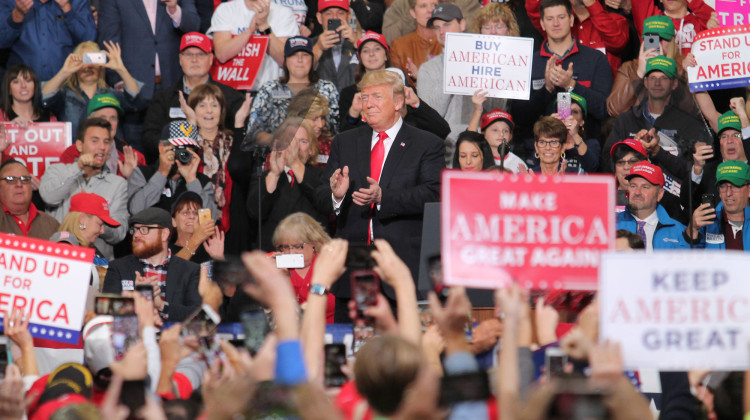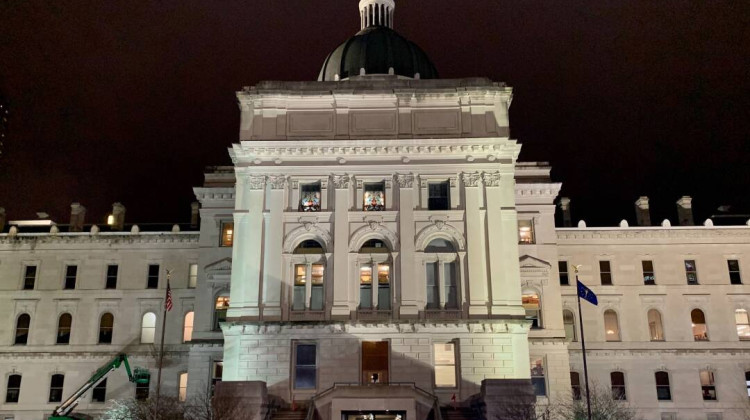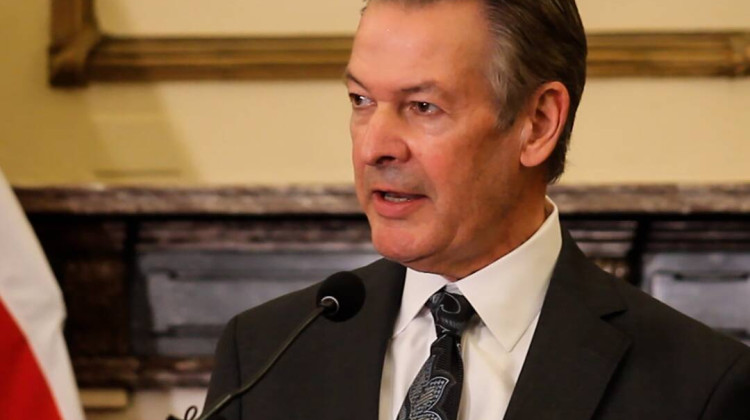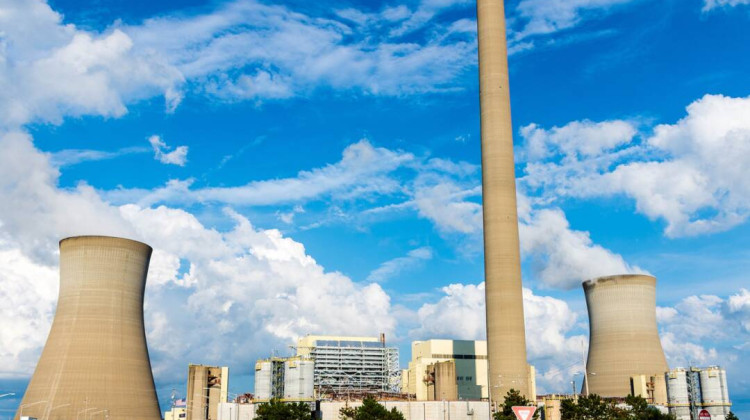
President-elect Donald Trump has promised to rescind any unspent dollars from the Inflation Reduction Act – the Biden administration’s major climate bill which funds everything from energy efficiency upgrades to homes to green manufacturing.
Lauren Chapman / IPB NewsDonald Trump’s second presidential term is likely to slow climate progress in the U.S., according to an environmental and energy policy expert.
Scientists from the Intergovernmental Panel on Climate Change have said we need to significantly cut fossil fuel emissions around the globe by 2030 to avoid the worst effects of climate change.
David Konisky is a professor at the O'Neill School of Public and Environmental Affairs at Indiana University and researches environmental and energy policy.
He said even though the Biden administration made significant strides to address climate change, it still fell short of where the U.S. needs to be.
Konisky said achieving these goals requires changes that can’t happen overnight — like switching the nation to electric cars.
“And if we now have four years of interruption, perhaps longer, it makes achieving any kind of goal around 2030 or any sort of objective of net zero by 2050, virtually impossible for the United States,” he said.
The U.S. has long been the second largest emitter of greenhouse gasses, China is the first. Konisky said other countries could try to make up the difference, but it’s hard to imagine countries like China taking big steps to decarbonize if the U.S. doesn’t lead the way.
Konisky said some U.S. states and corporations have plans to reduce their emissions or transition to greener sources of energy. He doesn’t expect those to change and said they may even try to do more in light of the election.
“At the end of the day, however, the federal government is really important. And we think about states like Indiana. It's hard to imagine our state doing much around climate change if there's not a strong push from the federal government,” Konisky said. “So while some states may try to fill this gap and some corporations may try to do what they can and the nonprofit sector will advocate to the best of their ability. To some degree, there's no replacing the size, the scale and the power of the federal government to lead.”
Indiana Public Broadcasting talked with Konisky about what we can expect from Trump’s climate policy over the next four years.
Looking to engage with Indiana’s state government? Learn more about Gov.-elect Mike Braun’s stance on environmental issues, find how to contact your state lawmakers and consider testifying on legislation through our project, Civically, Indiana.
What promises has Trump made related to climate change on the campaign trail?
Konisky said Trump wants to get rid of the Inflation Reduction Act — the Biden administration’s major climate bill that put money toward everything from building electric vehicle manufacturing plants to tax breaks for homeowners who make their homes more energy efficient.
Billions of dollars from the Inflation Reduction Act have already been awarded. Indiana companies like Samsung, Stellantis and Toyota received funds to build electric vehicle manufacturing plants in Indiana. Groups in the state also got funding for community solar projects, planting cover crops on farms and urban tree canopies, among other things. That money can’t be taken back, said Konisky. But he said Trump could use his administrative powers to block future awards.
“Certainly the Trump administration will try to potentially rescind dollars that have not yet been spent or sort of gum up the system to prevent sort of money that might be kind of in-process, if you will,” Konisky said.
Konisky said we will also likely see Congress try to change parts of the law.
“I suspect that Republicans will try to peel back some portions of the Inflation Reduction Act but will try to keep others in place because they, their constituents, businesses in their districts or in their states are benefiting,” Konisky said.
Trump has also made promises to boost U.S. oil production. Konisky said that often means more leases for drilling oil and offering up more places for extraction — like in the Arctic.
“Of course, the United States is already at record levels of production for oil, natural gas. So there needs to be a market for these resources. And, you know, we're already doing so much of that development, I'm not sure how much will really change,” he said.
Unfortunately, there’s no guarantee that more domestic oil production will drive down the cost of gasoline. Oil is traded on a global market — which means it’s often subject to what’s happening in other countries.
Trump also wants to place tariffs on goods from other countries. Konisky said that will likely make things like solar panels and electric vehicles more expensive and drive down their adoption.
“So that is not a good thing for consumers. It may have some local benefits for U.S. based companies and for the communities where they work — in terms of providing jobs to build up these technologies. But for consumers, we're likely to face higher prices,” he said.
Ironically, bringing manufacturing jobs for clean energy technologies to the U.S. was a major part of what the Inflation Reduction Act was trying to address.
What can Trump’s first term tell us about his plans for the next four years?
Trump rolled back more than 100 environmental rules during his first four years in office, according to the New York Times. That included seven finalized or proposed rule changes during the early days of the COVID-19 pandemic.
Konisky said Trump is likely to return to this deregulatory playbook — rolling or scaling back everything from fuel economy standards, to emissions standards for power plants to funding for removing lead drinking water pipes. New Biden initiatives will also likely be on the chopping block.
But Konisky said Trump’s proposed rollbacks in his first term weren’t always successful.
“Often they took shortcuts and the analysis that they included in these rulemaking repeals didn't meet legal standards. Right? It was met by real skepticism by the courts. I suspect the Trump administration has learned from those experiences and will be more diligent in making sure that these new efforts are more likely to survive legal challenge,” he said.
Konisky said the U.S. Supreme Court also looks different than it did when Trump was first elected as president. Trump appointed three U.S. Supreme Court justices from 2017 to 2020.
Join the conversation and sign up for the Indiana Two-Way. Text "Indiana" to 765-275-1120. Your comments and questions in response to our weekly text help us find the answers you need on statewide issues, including our project Civically, Indiana.
Two justices who often sided in favor of climate action are no longer serving. Justice Ruth Bader Ginsburg died in 2020 and Justice Stephen Breyer retired in 2022.
Trump also tried to undermine the science environmental rules are based on and Konisky said he’ll likely do that again as well. Some examples include attempts to redefine Waters of the United States and change how the EPA justifies air pollution regulations.
“Rulemakings are complicated. They are required to be evidence-based. That is their intent and that's the requirement in place,” Konisky said. “But for that to be possible, you need to have the capacity and the personnel and the resources to do the good science. So one strategy for making it difficult to make those kinds of rules in the future is to remove those resources, to remove that capacity and hollow out that part of the federal government. And I think President Trump has been quite clear that is one of his priorities.”
Konisky said he expects Trump will once again withdraw the U.S. from the Paris Climate Agreement and step away from other global climate obligations. He expects Trump will also abandon all of the Biden administration’s commitments to environmental justice.
“The Biden administration has really emphasized social justice as part of its initiatives around climate, energy and environmental policy. But these were all administrative actions. They were discretionary and they're very easy for subsequent president to walk away from. So I think we'll see efforts to remove that piece and that emphasis from the agenda of the federal government,” Konisky said.
What will the Biden administration do in the last few weeks to further its climate agenda?
“I think certainly the Biden administration will try to finish any rule, make any rulemaking efforts it has ongoing in the climate space, continue to defend its regulations in the courts until the end of the presidential term,” Konisky said.
He said he expects the Biden administration will also try to allocate as much Inflation Reduction Act funding and sign as many contracts related to the IRA as it can.
“They'll try to speed up those processes to try to get that done before the new administration takes hold. That said, it's only two and a half months. They've already been trying to do many of these things. So I don't know that there's much more that they can do at this stage,” Konisky said.
Rebecca is our energy and environment reporter. Contact her at rthiele@iu.edu or follow her on Twitter at @beckythiele.
 DONATE
DONATE








 Support WFYI. We can't do it without you.
Support WFYI. We can't do it without you.